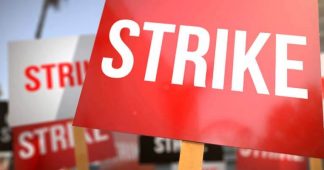By Robert Stevens
Britain’s Conservative government is preparing to use the armed forces against a growing strike movement. In the next weeks, strikes will be held by hundreds of thousands of nurses, ambulance staff, highway workers, airline workers and civil servants, alongside ongoing national strikes by postal and rail workers.
The struggle by workers in Britain is an advanced expression of a developing movement of the working class internationally. In every country, workers are fighting back against the demands by governments and corporations that they sacrifice their living standards, working conditions, pensions and jobs. This demand is to enable the shoring up of record profits and the funnelling of tens of billions of pounds, dollars and euros to cover the cost of the bailouts of big business during the pandemic, and the upscaling of military budgets amid an escalating war by US and NATO against Russia in Ukraine.
Last week, a general strike was held in Italy, the second this year, involving workers in all industries, including Trenitalia and Trenord rail workers. In November, there were general strikes in Belgium and Greece and a mass strike in France. Greece’s general strike was also the second this year.
Last week, Belgian rail workers held a three-day strike, following strikes by refinery workers in France and the Netherlands.
Nadhim Zahawi, Tory party chairman, told Sky News’ Sophy Ridge on Sunday that the government “ha[s] contingency plans in place… We’re looking at the military, we’re looking at a specialist response force… surge capacity.” Troops could be “driving ambulances” and working on UK borders during strikes, he said. Echoing the denunciation of striking railworkers this summer as “Putin’s stooges,” Zahawi urged nurses not to strike so as to “send a very clear message to Mr. Putin,” adding that “This is not a time” for the UK “to be divided.”
The Cabinet Office acknowledged that around 2,000 military personnel and civil servants are being trained to support a range of services in the event of strike action. Downing Street’s threats were made in anticipation of Tuesday’s announcement that more than 10,000 ambulance workers are to strike on December 21 and 28. Like all National Health Service workers, they are being offered a miniscule pay deal while inflation surges above 14 percent.
The ambulance strike will follow that of around 100,000 nurses planned for December 15 and 20. Tens of thousands of firefighters are being balloted to strike, with the result to be announced in January.
This week, cabinet ministers are gathering in Downing Street for a series of Cobra meetings dealing with national emergencies or major disruptions. The Times reported Wednesday: “Ministers are holding talks today about calling in armed forces personnel to drive ambulances after unions called the first nationwide strike action by paramedics in three decades.
“The Department for Health and Ministry of Defence are holding discussions ahead of a potential formal request for help under the military aid to civil authorities protocol, or Maca.”
BBC political correspondent Nick Eardley tweeted Wednesday that when Downing Street was “asked about [the] option of banning strikes for ambulance workers,” this was “not explicitly ruled out.”
On Wednesday, Prime Minister Rishi Sunak told Parliament he was preparing “new tough laws” to combat strikes. The Sun newspaper, owned by Rupert Murdoch, reported last week that the government planned to “rush through an anti-strikes Bill” that “would open a new front in the Government’s war with health, rail and postal unions among others.” The “package may include using agency workers to fill strikers’ crucial roles and making it easier for bosses to replace strikers permanently,” the newspaper reported. This “would add to legislation currently going through Parliament to ensure a minimum level of service on strike days in key industries, such as rail.”
Minimum Service Level (MSL) legislation would require rail unions to guarantee that at least 20 percent of trains run during strikes or face a £1 million fine.
This assault on workers’ rights is a universal response by the ruling class internationally. Last week, US President Joe Biden signed into law a dictatorial bill passed by the Democratic Party-controlled Congress to impose a national rail contract rejected by tens of thousands of railroaders and outlaw strike action.
Minimum services legislation is already widely used across Europe and has spearheaded a turn to direct state repression to enforce brutal austerity ever since the 2008 global financial meltdown.
In 2010, Spain’s Socialist Party government forced 2,200 air traffic controllers back to work at gunpoint to smash a wildcat strike. Armed soldiers stood over them with the threat of immediate arrest should they stop work.
This summer, Spanish airline and metal workers were subjected to minimum service orders by Spain’s Socialist Party (PSOE)-Podemos government, and Ryanair imposed a minimum service requirement preventing many workers from legally stopping work. The previous month, Hungary’s far-right government imposed minimum service levels, preventing most teachers from joining strikes.
In October, the Macron government in France requisitioned striking refinery workers to force them back to work and break a powerful action hitting the arteries of the economy.
As it prepares the ground for a state offensive against Britain’s working class, the Tory government is depending on the trade union bureaucracy to deepen its ongoing efforts to police and suppress demands for broader strike action.
For months, the trade union leaders have done everything in their power to isolate and contain strikes by rail, postal, telecoms and university staff and prevent them from coalescing into a general strike. Last week, the Communication Workers Union bureaucracy agreed with British Telecom to a well-below inflation pay settlement for 40,000 workers, aimed at ending one of the four ongoing national strikes. Talks are being held continuously between the government and the rail, education and health unions in the hope of imposing a similar rotten agreement.
The threat of anti-strike legislation is not directed against the bureaucracy but aimed at providing it with ammunition to use against rank-and-file trade union members. Over the last four decades, the Trades Union Congress and its affiliated unions have refused to challenge the many anti-strike measures imposed by successive Tory governments, including the outlawing of secondary action, which makes a general strike illegal. The trade unions would respond to the use of the armed forces and the imposition of MSL orders by insisting that the law be upheld and strike action called off.
In the trade union bureaucracy, workers confront adversaries who are dedicated to the suppression of the class struggle. Without their efforts at containment and sabotage, the balance of class forces between tens of millions of workers and the bourgeoisie would be so radically altered that neither the army nor any number of repressive laws would be enough to save the profit system.
The most important task for workers in every country as they fight the offensive of the capitalist state is to seize control of their struggles from the trade union bureaucracy and return it to the shop floor. Workers must build their own fighting organisations, rank-and-file committees, democratically elected and acting independently of the suffocating grip of the union bureaucracy.
Excerpt from an article published in wsws.org
We remind our readers that publication of articles on our site does not mean that we agree with what is written. Our policy is to publish anything which we consider of interest, so as to assist our readers in forming their opinions. Sometimes we even publish articles with which we totally disagree, since we believe it is important for our readers to be informed on as wide a spectrum of views as possible.











